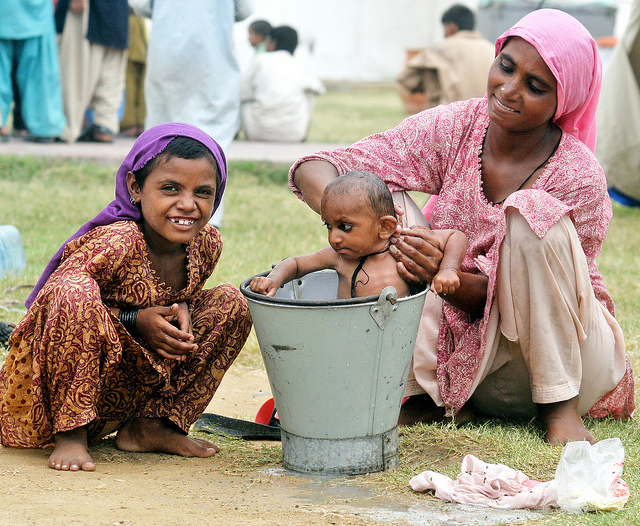Sunday, June 11, 2023
News and Views from the Global South
Oped: The World Faces Challenges on Poverty & Inequalities

Credit:Fahim Siddiqi/IPS
BONN, 11 Nov 2016 -- The 17 Sustainable Development Goals (SDGs) were adopted by world leaders and officially came into force on 1 January 2016. The SDGs are meant to be achieved by the next 15 years. On the one hand, these goals are quite ambitious and urgently necessary. On the other hand, they just seem to be business-as-usual strategy considering the dominant political and economic scenario.
The first goal is to eradicate poverty in all its forms. However, this is believed to be achieved by economic growth, the same old recipe that has not been very successful in the last decades. Global inequality has just been increasing, half of the world’s wealth belongs to 1% of the population and nearly 1/2 of the world’s population live on less than $2.50 a day.
Sustainable development is defined as “development that meets the needs of the present without compromising the ability of future generations to meet their own needs” (World Commission on Environment and Development, 1987). Instead, we are not even meeting the needs of our own generation; while some have a high pattern of consumption, others can barely satisfy their own needs.
Even if poverty eradication were viable by economic growth, one planet Earth would not be enough to sustain ourselves if we continue to pursue unbridled growth as the ideal model for the economy. As UN Secretary-General Ban Ki-moon said recently “There is no plan B because we do not have planet B”.
This pattern of development based on endless growth and natural resource exploitation coming mainly from developing countries is leading the world to a collapse. We must rethink the paths we have been following and we need to change our relation with the Earth and the whole structure of our societies.
UN Secretary-General Ban Ki-moon
Issues such as poverty, global inequality and climate change, for example, are not isolated challenges of the system, but the neoliberal order itself provokes them unavoidably, they are the results of it.
Developing countries are expected to reach development one day. Once again, this will not happen unless we have more Earths available to our exploitation. Secondly, why should this pattern of development that is costing so much be considered a role model to be followed when there are groups already living truly sustainable in the world?
Climate action is another sustainable development goal. However, even though the Paris Agreement has just entered into force, there are not many reasons to celebrate it. Obviously, during COP 22 in Marrakesh, currently underway, world leaders will not even question the economic order. Even though investments in renewable energy are fundamental to combat climate change, it will not solve the issue alone.
In the crises we are currently facing, technocracy will not be enough to solve our problems this time. This old belief inherited from the Enlightenment is itself part of the problem.
Besides, the solutions in the Agreement to combat climate change are market based driven, the carbon markets do not promote any substantial change. Actually, it is exactly the opposite. It is capitalism reconfiguring its ways of accumulation. The current pattern of production and consumption is maintained.
The irresponsible neoliberal order has been pushing flawed solutions to address this biggest challenge faced by humankind, such as the commodification of nature through the privatization of the CO2. Meanwhile we see mainly business-as-usual and greenwashing at the political stage, the poor will be the most negatively affected by climate change.
In the United Nations report, The World Economic and Social Survey 2016: Climate Change Resilience—an Opportunity for Reducing Inequalities, Ban Ki Moon affirmed that “Sadly, the people at greater risk from climate hazards are the poor, the vulnerable and the marginalized who, in many cases, have been excluded from socioeconomic progress”. “We have no time to waste—and a great deal to gain—when it comes to addressing the socioeconomic inequalities that deepen poverty and leave people behind.”
This year was the hottest year on record, there was the smallest Arctic sea ice extent registered since 1979, there will be more plastic than fish in the sea by 2050 and the global wildlife population will have declined by nearly 67 percent by 2020.
These are just a few examples about the dark scenarios that world is and will be facing. We can no longer afford to live on endless growth basis. In fact, if we do not start to rethink our societies and if there is no substantial change in the dominant economic order, we will just continue to go to an abyss, taking all the living creatures on this planet with us.
Following a series of two-day media training workshops on the UN's post-2015 global development agenda, we will be running feature articles and oped pieces written by some of the young journalists who participated in them. Sponsored by Inter Press Service (IPS) news agency, the media workshops are supported by the UN Foundation.
The series of articles will focus on the UN's 17 Sustainable Development Goals (SDGs), approved by world leaders during the UN General Assembly session in September 2015, and the Climate Change Agreement which came into force in November 2016.

 Print
Print


